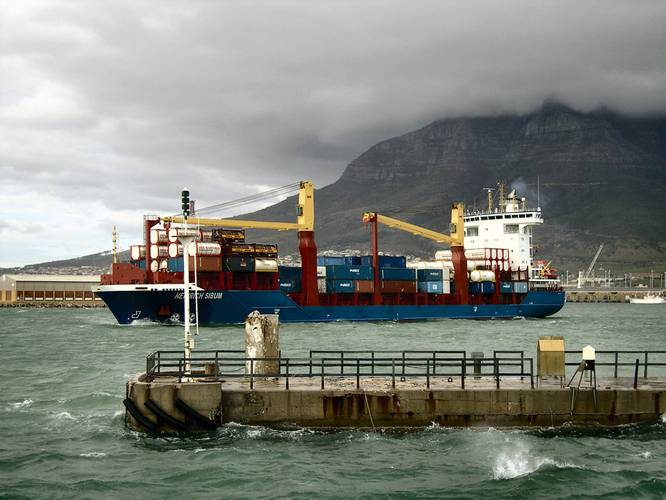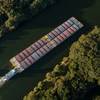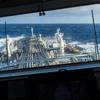'Blue' Economy Ocean Industries & the Next 50 Years
“Sustainable development” has gone from buzz word to business imperative in the two decades since the initial Earth Summit in Rio de Janeiro in 1992. Companies are increasingly evaluated on how well they address sustainability as a critical measure of their commitment to the triple bottom line – people, planet and profit.
Stakeholders expect companies to develop sustainability and corporate responsibility programs and reporting as part of efforts to take up civil society concerns and maintain the social license to operate. The world’s governments are poised to endorse a set of Sustainable Development Goals (SDGs) at a UN Summit in New York in September 2015. These SDGs are intended to define the aspirations and targets to guide governments, society - and business - for the next 15 years. One of the SDGs specifically focused on the ocean, with targets to address use levels, planning impacts and environmental protection. Many of the other SDGs have goals with significant implications for businesses worldwide, including the maritime industries.
To all this, the ocean business community can now add a new term - the “Blue Economy” - that that you will be hearing more and more. Broadly speaking, the Blue Economy is being defined as:
A sustainable ocean economy emerges when economic activity is in balance with the long-term capacity of ocean ecosystems to support this activity and remain resilient and healthy.
What does all this mean for the people and companies providing ocean goods and services are fundamental to the future of the ocean?
The future of the ocean health and the concept of a Blue Economy are inextricably intertwined with the more fundamental, long-standing and ongoing reality of the ocean economy – the broad range of commercial activity undertaken for centuries by a diverse ocean business community that provides society with the ocean-related goods and services it demands.
This ocean economy depends on millions of people around the world who work on, under and around the sea every day to bring us ocean goods and services to support humanity. These men and women know the ocean better than most everyone else on the planet and care about the ocean that their kids and grandkids will inherit. Although much of the vast and diverse ocean economy is “out of sight and out of mind” for most, the people, companies and their activities that make up the ocean economy are the essential starting point and long term basis for any consideration of ocean sustainable development and a Blue Economy.
What is this ocean economy?
It is an estimated $4-10 trillion dollars/year in economic activity, including:
• 90% of international trade through cost- and carbon-efficient delivery via 50,000+ merchant ships crisscrossing the globe;
• Healthy protein from fisheries, from about 1.3 million fishing vessels, and from fish farms, with aquaculture growing 7% per year the past decades and now producing 50% of seafood;
• Growing offshore energy sources that supply about 30% of hydrocarbons, a rapidly increasing amount wind energy, and major wave and current energy potential;
• 98% of international telecommunications, carried on more than one million km of submarine cables;
• Recreation and tourism options for every ocean interest, with cruise tourism growing at 8.5 % per year in recent decades;
• Desalinated seawater to live in our booming coastal cities, with desalination supplying 90% of the freshwater in some countries;
• Innovation and technology to discover and document the deepest darkest corners, furthest reaches and extreme conditions of planet ocean;
• Ports and coastal infrastructure that all countries depend on for trade and growth; and
• Much else that sustains our modern life, booming population and growing expectations.
However, our use of ocean space and resources is affecting ocean health and sustainability. These effects of sea-based activities are also accompanied by often much more significant land-based sources of impacts, such as municipal wastes, agricultural runoff and plastics.
Ocean industries operate in a fluid, three-dimensional, interconnected ocean. This means industry’s activities, responsbilities, and impacts are also interconnected – as must be industry sustainable developmnet efforts. The best efforts by a single company or even a whole industry sector will not be enough to secure ocean health and productivity into the future.
This creates a compelling business case for industry leadership and collaboration in tackling ocean sustainability, stewardship and science. Fortunately, there are many good, smart people in good, smart companies who do their best to understand and address ocean sustainable development. These leadership companies conduct their business in a manner that is compatible with the balanced environmental and economic needs of the communities in which they operate.
To further enhance responsible operations throughout different ocean industry sectors, a group of companies banded together to form the World Ocean Council (WOC) – the international, multi-industry business leadership alliance for “Corporate Ocean Responsibility”. This collaboration helps identify sustainability risks, gaps and practical cross-sectoral, science-based solutions.
Cross-sectoral WOC teams are putting this unique industry alliance to work on a range of topics, such as ocean policy and governance; marine spatial planning/ocean zoning; invasive species; marine debris/port reception facilities; marine sound; and improved ocean data collection. Robust data-sets, peer-reviewed published science, risk assessments, and use of the best available technologies are essential to these efforts.
An increasing number and range of ocean industry companies from around the world are distinguishing themselves as leaders in “Corporate Ocean Responsibility” by joining the WOC and are collaborating to achieve the “Blue Economy” - a balance of responsible ocean use and sustained ocean health.
How does all this relate to the future of the ocean? What are the projections for ocean industry activity in the coming decades? What opportunities and risks will future ocean use create for each sector, for the collective ocean business community, for the ocean economy overall, and for the ocean itself?
The diverse ocean business community will gather in Singapore (9-11 November 2015) at the 3rd WOC Sustainable Ocean Summit (SOS) to tackle these fundamental questions with a focus on “Sustainable Development and Growing the Blue Economy - the Next 50 Years.”
The SOS 2015 theme recognizes the contribution of the ocean economy to the food, energy, transport, communications and other needs of society and the role of the ocean business community over the next 50 years in:
• Ensuring the health, productivity and sustainable development of the ocean.
• Advancing responsible ocean economic activity that contributes income, jobs, goods and services in support of societal needs.
• Addressing how ocean industries can advance their leadership, collaboration and commitment to sustaining the interconnected ocean environment, people and economy.
• Planning for the next 50 years of Blue Growth, sustainable ocean economic development and responsible ocean business opportunities.
• Determining how ocean industries relate to the UN Sustainable Development Goals (SDGs).
The “Ocean + 50” plenary at the SOS 2015 will in particular be an unprecedented look into the future of ocean use around the world and across the sectors. Expert presentations will cover shipping, oil and gas, fisheries, aquaculture, renewable energy, cruise tourism, marine mining and submarine cables in this first-ever comprehensive platform on the future of ocean industries. The session will address the trends, geographies, assumptions, opportunities, and risks for each sector over the coming 50 years. The session will focus especially on 2015-2030, the time frame for the Sustainable Development Goals (SDGs) soon to be adopted by the U.N.
To learn more about the WOC and the SOS 2015, visit http://www.oceancouncil.org/site/summit_2015/
The Author
Paul Holthus is founding CEO of the World Ocean Council - the international, multi-industry business leadership alliance on Corporate Ocean Responsibility.
e: [email protected]
The Sustainable
Ocean Summit 2015
November 9-11, 2015, Singapore
The Sustainable Ocean Summit (SOS) is the only global, multi-sectoral platform for leadership companies and organizations to advance the development and implementation of industry-driven solutions to ocean sustainability challenges. With Singapore celebrating its 50th anniversary in 2015 and continuing to advance its significant role in the global maritime economy, SOS 2015 will bring together the diverse ocean business community to plan for the next 50 years of Blue Growth, a sustainable ocean economy and responsible ocean business opportunities.
www.oceancouncil.org/site/summit_2015/
(As published in the September 2015 edition of Maritime Reporter & Engineering News - http://magazines.marinelink.com/Magazines/MaritimeReporter)


















